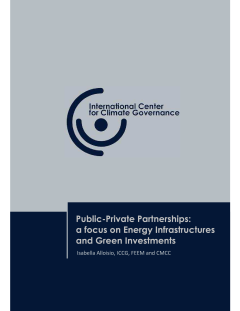
Economic recession has limited national budget spending and the lending capacities of commercial banks for the realization of infrastructure projects in the field of energy generation, transmission and distribution.
This article highlights the potential of Private Public Partnerships (PPPs) for accessing finance and reducing capital expenditure (capex costs) of energy infrastructure projects in this current time of shrinking financial resources, which have widened the gap between public and private funding. The article points out that through PPP, the private and public sectors can reach a mutually beneficial agreement: the private sector can have the guarantees it needs to face risks entailed in the time gap between the project’s planning phase and its actual implementation, whereas the public sector can obtain capital investment and management expertise.
